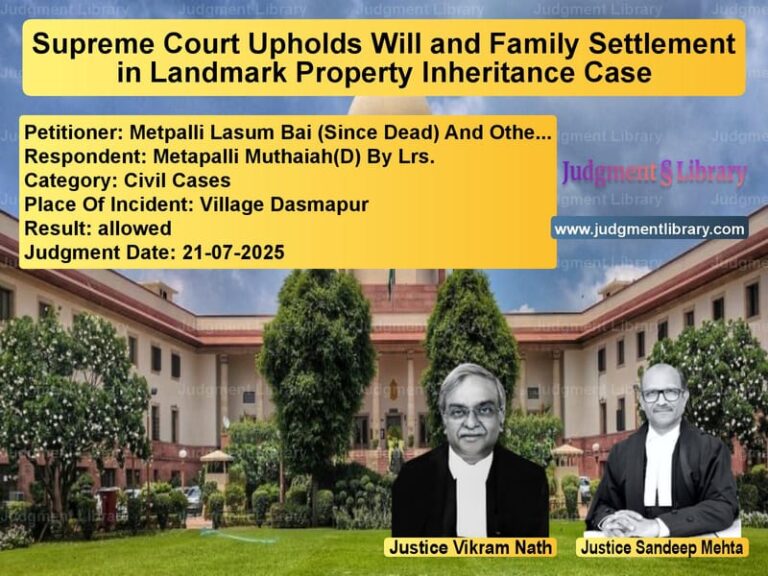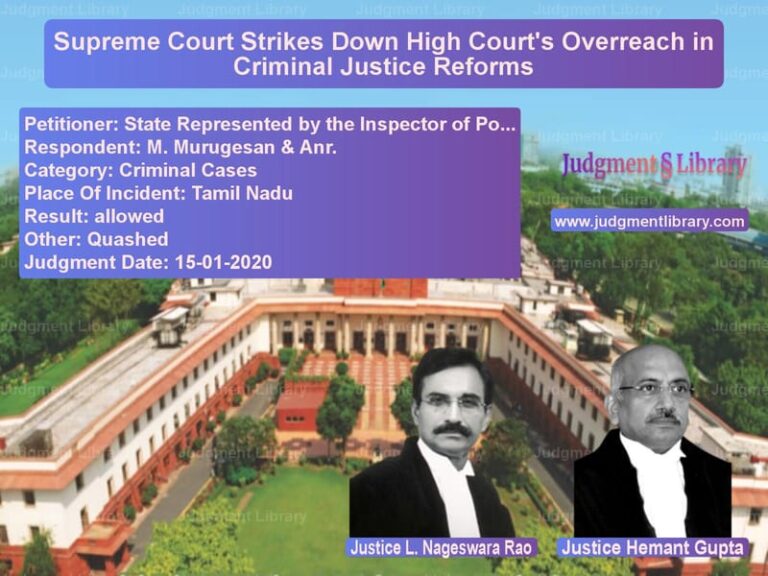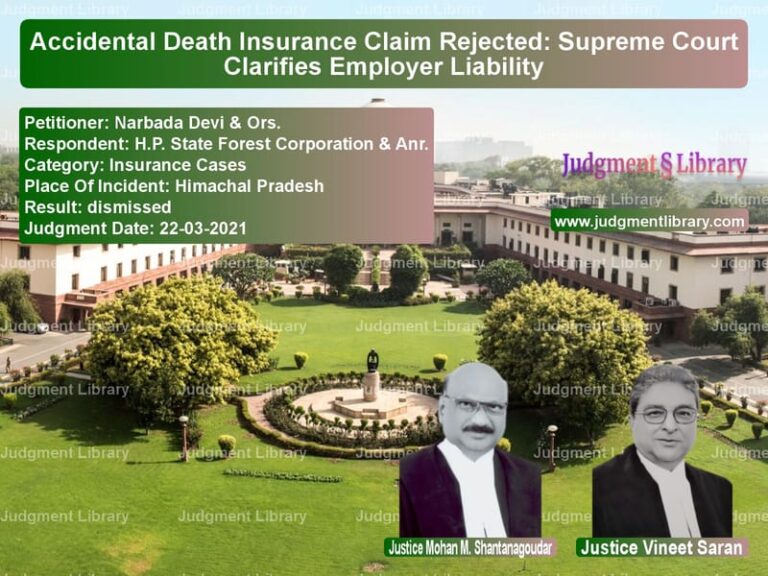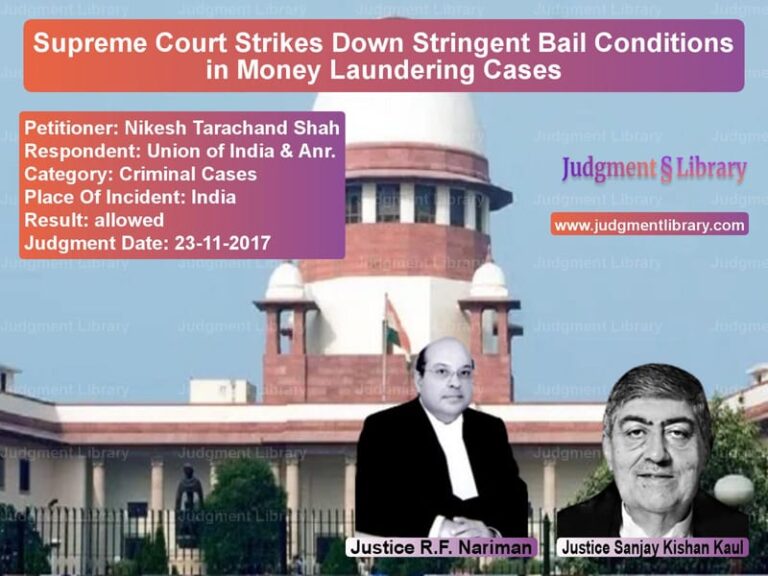Land Recruitment Dispute: Supreme Court’s Judgment on Expanding Rank Lists for Junior Health Inspectors
The case of Ajith G. Das & Ors. vs. The State of Kerala & Ors. revolves around the issue of the expansion of rank lists for the post of Junior Health Inspector Grade-II in the Municipal Common Service across various districts in Kerala. The Kerala Public Service Commission (KPSC) had issued notifications for recruitment in 2014, but due to procedural delays and overlapping of candidates in the rank lists, several vacancies remained unfilled. The appellants sought the expansion of these rank lists to fill the unfilled vacancies. The case reached the Supreme Court after the Kerala High Court dismissed the appeal, affirming the decision of the Kerala Administrative Tribunal (KAT), which had ruled against expanding the rank list.
Background of the Case
The recruitment process for the post of Junior Health Inspector Grade-II in Kerala started in 2014, when the KPSC issued two separate notifications for recruitment in different districts. The first notification, dated 26.12.2014, was issued under Category No. 571/2014 for nine districts, while the second notification, dated 29.05.2015, was issued for five additional districts. The process included a common written test and interview for all the candidates, followed by the publication of the rank lists for these districts.
However, due to the overlap of candidates in the different lists and issues regarding the eligibility of members, the rank lists for several districts became exhausted prematurely. This led to several vacancies remaining unfilled. The appellants, who were included in these rank lists, sought to have the lists expanded to fill these unfilled vacancies. They contended that due to the peculiar circumstances, many vacancies could not be filled due to candidates opting out or failing to join. The issue was further compounded by the fact that candidates from multiple lists were considered for appointments in different districts, leading to many vacancies remaining unfilled.
Arguments of the Petitioners
The petitioners, represented by their counsel, argued that:
- The rank lists had been exhausted due to procedural errors in the creation of the lists, including the fact that many candidates were included in multiple lists, leading to early exhaustion of the lists.
- The government had not properly anticipated the vacancy requirements when the notifications were issued and had failed to consider the unfilled vacancies properly.
- The applicants were qualified and had a legitimate right to be considered for the unfilled vacancies, as per the merit listed in the original rank lists.
- The decision by KPSC to refuse the expansion of the rank list was not in accordance with the principles of fairness and equity, given the fact that multiple unfilled vacancies existed due to procedural errors beyond the petitioners’ control.
Arguments of the Respondent
The respondent, the State of Kerala and KPSC, countered the petitioners’ arguments with the following points:
- KPSC had followed the established procedure in preparing the rank lists and had not violated any rules. It was the prerogative of KPSC to determine the number of candidates to include in the rank list based on reported vacancies.
- The rank lists had already been issued and were valid for a specific period, and no further vacancies could be filled unless a new recruitment process was initiated.
- Expanding the rank list would create a negative precedent for future recruitment processes and would undermine the established procedures.
- The government could not direct KPSC to expand the lists, as KPSC was an independent constitutional body with authority over the recruitment process.
Supreme Court’s Analysis
The Supreme Court, after hearing both sides, critically analyzed the key issues, including the role of the State Government and KPSC in determining vacancies and the constitutional autonomy of KPSC in conducting recruitment:
- The Court acknowledged the complex nature of the recruitment process, which involved overlapping candidates from different lists and the exhaustion of the rank lists due to various factors such as candidates opting for postings in different districts and failure to join.
- The Court emphasized the importance of transparency and fairness in the recruitment process, noting that any procedural errors that led to vacancies remaining unfilled needed to be addressed in a manner that did not disadvantage qualified candidates.
- The autonomy of KPSC in deciding on the rank lists was recognized, but the Court noted that such autonomy must be exercised in a way that does not undermine the principles of fairness and transparency in public employment.
- The Court also considered the extraordinary circumstances, including the long delays in completing the recruitment process, and highlighted the importance of ensuring that qualified candidates were not deprived of opportunities due to administrative oversights.
Final Judgment
The Supreme Court ruled in favor of the appellants, granting the relief sought. The Court held:
- The refusal of KPSC to expand the rank lists was arbitrary and not in line with the principles of fairness and transparency in public recruitment.
- The rank lists should be expanded to include the unfilled vacancies identified by the State Government, and KPSC was directed to take immediate steps to implement this decision.
- The Court emphasized that the State Government’s role in notifying vacancies was integral to the recruitment process, and that KPSC’s refusal to act on the government’s recommendation to expand the lists was a failure to fulfill its constitutional responsibilities.
- The Court’s judgment served to correct the procedural flaws in the recruitment process and ensure that qualified candidates were not unfairly excluded due to administrative delays and errors.
Conclusion
This ruling is an important one for ensuring transparency and fairness in government recruitment processes. It underscores the need for both the State Government and KPSC to work in harmony to ensure that vacancies are properly filled in a timely and efficient manner, with due regard for the rights of candidates. The judgment reinforces the idea that constitutional bodies like KPSC, while autonomous, must also be held accountable for ensuring fairness in the recruitment process.
Petitioner Name: Ajith G. Das & Ors..Respondent Name: State of Kerala & Ors..Judgment By: Justice Vikram Nath, Justice Prasanna B. Varale.Place Of Incident: Kerala.Judgment Date: 18-12-2024.
Don’t miss out on the full details! Download the complete judgment in PDF format below and gain valuable insights instantly!
Download Judgment: ajith-g.-das-&-ors.-vs-state-of-kerala-&-or-supreme-court-of-india-judgment-dated-18-12-2024.pdf
Directly Download Judgment: Directly download this Judgment
See all petitions in Contract Disputes
See all petitions in Property Disputes
See all petitions in Landlord-Tenant Disputes
See all petitions in Judgment by Vikram Nath
See all petitions in Judgment by Prasanna Bhalachandra Varale
See all petitions in allowed
See all petitions in Modified
See all petitions in supreme court of India judgments December 2024
See all petitions in 2024 judgments
See all posts in Civil Cases Category
See all allowed petitions in Civil Cases Category
See all Dismissed petitions in Civil Cases Category
See all partially allowed petitions in Civil Cases Category







